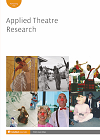- Home
- A-Z Publications
- Applied Theatre Research
- Previous Issues
- Volume 1, Issue 2, 2014
Applied Theatre Research - Volume 1, Issue 2, 2014
Volume 1, Issue 2, 2014
-
-
Questions on performances in place of war
More LessAbstractIn this article James Thompson discusses In Place of War, a research and practice-based initiative at the University of Manchester that has sought to document and examine theatre and performance projects in sites of contemporary armed conflict. He outlines the genesis of the project from practice-based training programmes in Sri Lanka in 2000, and examines the questions that it sought to answer in the main period of research between 2004 and 2007. The article includes descriptions of theatre projects and performances with which In Place of War has engaged – including DR Congo, Sri Lanka and Sudan. It explores how the differences between these projects raise questions about the relationship between the arts and conflict, memorialization and resistance. The article then provides an overview of the challenges presented by these different practices, and sketches some of the theoretical and conceptual frameworks that either have been useful in thinking through the projects, or have been tested by the questions that have arisen during the research process.
-
-
-
Playback Theatre as a response to the impact of political violence in occupied Palestine
More LessBy Ben RiversAbstractIn Playback Theatre, audience members volunteer stories from their own lives, then a team of performers subsequently turns each account into a piece of improvised theatre. The Freedom Theatre’s Freedom Bus troupe uses Playback Theatre for community-building, cultural activism and collective trauma response throughout the West Bank of Occupied Palestine. This article describes the Freedom Bus initiative, reflecting in particular upon the possibilities and limits of Playback Theatre for trauma response in the context of ongoing political violence and structural oppression. It also explores the preparatory and post-performance considerations necessary to ensure the health and effectiveness of the Playback Theatre practitioner.
-
-
-
Theatre in the container: Border-crossing pedagogy among women living with HIV and AIDS
More LessAbstractThis article falls under the broader field of applied theatre used as a tool for activism, education and therapy. The article examines the extent to which an applied theatre project I facilitated in Johannesburg enabled participants to cross the border between objectification and subjectivity. The project focused on how Giroux’s (1992) border crossing pedagogy as performance exploration can be used for empowering women living with HIV and AIDS in an informal settlement. The idea was to enable participants to find their voices and speak back to oppression and the reality of living positively. Findings indicate that drama offers people a platform to observe themselves and others. This platform can be a place for resistance, empowerment and liberation, and impacts on people’s perception of themselves as they face daily challenges, including living with HIV and AIDS.
-
-
-
Applied theatre as research: Provoking the possibilities
More LessAuthors: Michael Anderson and Peter O’ConnorAbstractThis article examines the potential for applied theatre as a research method. The context of the applied theatre as research (ATAR) approach is discussed, positioning the methodology within the community-based participatory research (CBPR) tradition and providing a discussion of the relationship between applied theatre as research (ATAR) and participatory action research (PAR). This approach positions research participants as ‘actors’ and, through various aesthetic approaches (including drama, music visual arts and dance), allows them to create meaning. The article contextualizes this discussion within a case study of an ATAR project developed in Redfern, Sydney, Australia in partnership with a large non-government organization (NGO) and young Aboriginal participants. We conclude with a discussion of the potential of this approach to become an effective and powerful research methodology and identify some of the impediments to that development.
-
-
-
Insights into approaching sexual health education through applied theatre methodology
More LessBy Trish WellsAbstractIn the context of a touring sexual health programme, this study explores the significance of shifting from a traditional transmission form of theatre in education to an applied theatre approach to pedagogy. This shift is particularly relevant when working with sensitive issues for adolescents. Applied theatre encourages students to move from the passive role of spectator and engage emotionally with the fictional world through action. Within this programme, students are encouraged to question the motives and attitudes of the characters and events presented. They investigate and unpack possibilities, and finally offer advice; in doing so, they may make relevant connections to their own lives, issues and relationships. The work values the students’ developing emotional intelligence and the knowledge that they bring to learning; it also gives students a voice and reinstates classroom dialogue.
-
-
-
Dramatic engagement reconsidered
More LessBy Julie DunnAbstractThis article draws upon a reflective memo developed as a result of research conducted in a primary classroom more than ten years ago to revisit and reconsider the notion of dramatic engagement. By reflecting on the ideas created in the original memo, and the data that underpinned it, a revised view of this concept is revealed, focusing on its meaning-making dimension as opposed to the observable, external qualities often associated with engagement. In addition, the importance of participants maintaining awareness of the actual world as they work collaboratively to co-construct the dramatic one is highlighted.
-
-
-
Book Reviews
More LessAuthors: Michael Balfour and George BelliveauAbstractRefugees, Theatre and Crisis: Performing Global Identities, Alison Jeffers (2012) London: Palgrave Macmillan, 216 pp., ISBN 978 0 230 24747 5, £53.00.
Distancing at Close Range: Investigating the Significance of Distancing in Drama Education, Stig A. Eriksson (2009) Vaasa, Finland: Arkmedia, 302 pp., ISBN 9 5212 2314 6, 9 7895 2122 3143.
-
Most Read This Month


